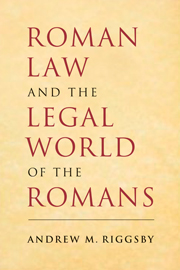Book contents
- Frontmatter
- Contents
- ROMAN LAW AND THE LEGAL WORLD OF THE ROMANS
- 1 Introduction
- 2 Roman History – The Brief Version
- 3 Sources of Roman Law
- 4 Sources for Roman Law
- 5 The Legal Professions
- 6 Legal Education
- 7 Social Control
- 8 Legal (In)equality
- 9 Writing and the Law
- 10 Status
- 11 Civil Procedure
- 12 Contracts
- 13 Ownership and Possession
- 14 Other Rights over Property
- 15 Inheritance
- 16 Women and Property
- 17 Family Law
- 18 Delict
- 19 Crimes and Punishments
- 20 Religious Law
- 21 Law in the Provinces
- 22 Conclusion
- Documents
- Glossary
- Further Reading
- Index
9 - Writing and the Law
Published online by Cambridge University Press: 05 June 2012
- Frontmatter
- Contents
- ROMAN LAW AND THE LEGAL WORLD OF THE ROMANS
- 1 Introduction
- 2 Roman History – The Brief Version
- 3 Sources of Roman Law
- 4 Sources for Roman Law
- 5 The Legal Professions
- 6 Legal Education
- 7 Social Control
- 8 Legal (In)equality
- 9 Writing and the Law
- 10 Status
- 11 Civil Procedure
- 12 Contracts
- 13 Ownership and Possession
- 14 Other Rights over Property
- 15 Inheritance
- 16 Women and Property
- 17 Family Law
- 18 Delict
- 19 Crimes and Punishments
- 20 Religious Law
- 21 Law in the Provinces
- 22 Conclusion
- Documents
- Glossary
- Further Reading
- Index
Summary
Ancient rome, whether represented today in popular movies or in scholarly books, often looks like a world full of writing. Written texts can outlive their mortal writers, and the effect is multiplied when multiple copies are made of one author's work. And clearly the Romans had a fascination with some forms of writing, such as inscriptions on stone. Yet most scholars agree that the average Roman was poorly or not at all literate. In such a world, it is perhaps not surprising that writing had an important but limited role in the law. The simplest illustration of this is provided by the Edict. The very name of this core set of rules points to the world of speech; the word literally means an order “spoken out” by the magistrate. At the same time, a citizen actually encountering the Edict would almost certainly have come across it in the form of an “album” – a wooden board whitewashed and written on with black ink. To examine the whole of the relationship between writing and the law, however, we will need to consider several different variables. What differences were there between the treatment of the laws proper and that of individual legal instruments (e.g., contracts)? Were all forms or media of writing equivalent? When did writing have a practical value (as external memory or evidence, for instance), and when did it become part of the law itself? As I suggested earlier, Roman attitudes contain some self-contradiction.
- Type
- Chapter
- Information
- Roman Law and the Legal World of the Romans , pp. 87 - 98Publisher: Cambridge University PressPrint publication year: 2010



